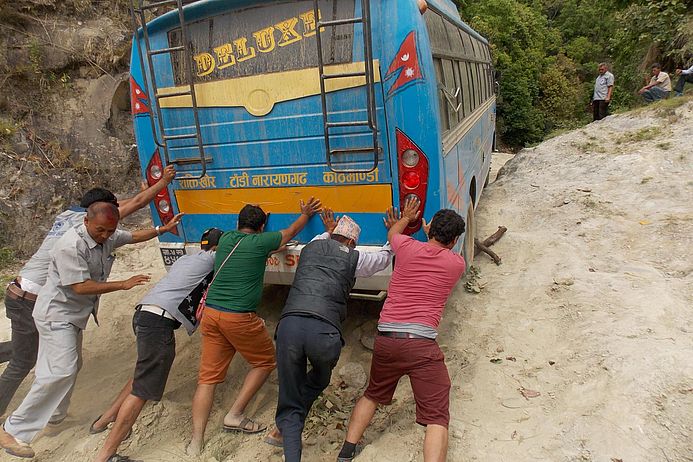In the days following the earthquake in Nepal in early 2015 there were many reports in German media about how local officials restrained Western aid workers from doing what they had come to do. Far fewer explained the Nepalese point of view or showing the mistakes of the international aid industry: one reason for delays at Kathmandu airport was that heavy military aircraft carrying aid materials had damaged the runway; prepackaged food were being flown in from all over the world, even though Nepalese farmers could have supplied sufficient local food; NGOs were delivering bottled water to mountainous regions where there was no shortage of water. Speed just isn’t always everything.
About a year has passed, and the battle over speed has flared up again. International organisations are now complaining that reconstruction is taking too long. To some extent this is true. But at the same time we must remember that the country is in a process of far-reaching political and social change. For example, after years of struggling over a new constitution the country has now adopted an electoral law intended to give currently disadvantaged ethnic, religious and social groups a voice in politics. All this is not without conflicts, but it is the environment within which reconstruction has to be organised.
International organisations would like to have a free hand – to help, but also to meet their own deadlines and targets. However, the Nepalese Government is insisting that every project must be coordinated with it, and has created an agency to organise reconstruction centrally. ‘The international organisations want to complete a lot of high-visibility projects quickly, and then leave again. But the government’s approach favours aid over a wide area,’ explains Brabim Kumar from medico partner Ayon, the network of Nepalese youth organisations. This is another perspective: The Nepalese Government might have learned from the mistakes made in Haiti. There, international relief agencies largely ignored local institutions, weakening Haitian structures permanently. It could be different in Nepal, given that a democratisation process in the society continues. It won’t be fast – but it could be sustainable.
Bernd Eichner
Since the earthquake in Nepal, medico international is supporting the reconstruction work of local partner organisations – Nepal Development Society (NEDS), Public Health Concern Trust Nepal, Environmental Camps for Conservation Awareness (ECCA), the Association of Youth Organizations Nepal (AYON) and Health And Nutrition Development Society (HANDS)– in building homes and rebuilding schools and health centres. Survivors learn in workshops how to press for accountability from local elites and government institutions.

